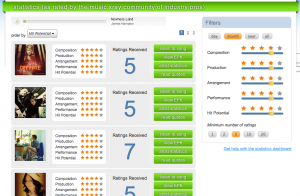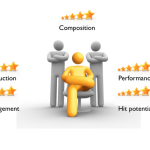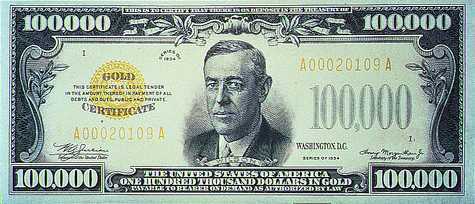On Saturday October 1st, Bob Lefsetz asked this question in his post located here.
I have dedicated the past 10 years (of my 20 in this business) to precisely this question – or as I ask it now, “How can we make the A&R process more efficient and more accurate?”
 On this subject – the data-driven question of “can you predict a hit” – I’ve put in my 10,000 hours and then some. Speaking of which, here’s an excerpt from Malcolm Gladwell’s article on my work in this field from The New Yorker (October 2006). Here’s me discussing this type of work with Gladwell at the New Yorker Conference in 2007. Here’s an sinopsis of an episode of the CBS series Numb3rs that used our research and technology as inspiration for their entire story line (if you only check out one of these links, check out that one). Lastly, this is a link to the Harvard Business School case study done on our work in this field.
On this subject – the data-driven question of “can you predict a hit” – I’ve put in my 10,000 hours and then some. Speaking of which, here’s an excerpt from Malcolm Gladwell’s article on my work in this field from The New Yorker (October 2006). Here’s me discussing this type of work with Gladwell at the New Yorker Conference in 2007. Here’s an sinopsis of an episode of the CBS series Numb3rs that used our research and technology as inspiration for their entire story line (if you only check out one of these links, check out that one). Lastly, this is a link to the Harvard Business School case study done on our work in this field.
I could go on. The work has been featured in numerous documentaries from BBC to Discovery to NatGeo and so on…
In 2001, I joined forces with a smart, family-owned software company outside Barcelona, Spain that had come up with a technology (at the time it was cutting-edge) that could analyze the acoustic properties and underlying mathematical patterns in music. Together, we started a company called Polyphonic HMI and began trying to sell a music recommendation system to music retailers. Digital retail did not exist so we were trying to sell it to Best Buy, Tower, Sam Goody etc. Our only true competition was a small start-up called Savage Beast from Silicon Valley. They were using people to classify songs instead of computers, however.
we started a company called Polyphonic HMI and began trying to sell a music recommendation system to music retailers. Digital retail did not exist so we were trying to sell it to Best Buy, Tower, Sam Goody etc. Our only true competition was a small start-up called Savage Beast from Silicon Valley. They were using people to classify songs instead of computers, however.
We were both too early to market and we both nearly went bankrupt. Savage Beast went back to the drawing board, changed their name to Pandora and the rest is history. We went back to the drawing board and came up with a service called Hit Song Science. We realized that making a prediction about the music someone would likely enjoy based upon their favorite songs was only slightly different than making a prediction about what music an entire market would enjoy based upon what it had proven to enjoy in the past – i.e. hit songs.
After months of fine-tuning, the technology worked pretty well when used properly. It had its limitations but if you took those into account, you could glean some really good data that really helped choose the single on an album that would likely encounter the least market resistance when promoted on par with all the other singles being promoted contemporaneously.

Mike McCready & Malcolm Gladwell
In short, we determined, within reasonable margins of error, that most hit songs (even in brand new genres) conform to predictablepatterns – concrete combinations of melody, harmony, beat, tempo, rhythm, octave, pitch, chord progression, fullness of sound, cadence, sonic brilliance etc. Songs that sound like hits to the human ear but that do not match one of the common “hit song patterns” face much steeper market resistance than those that do. I recognize there is much additional data that could be observed (as per Lefsetz’ post) but this is where we started.
A few labels embraced the service and tried to use it as we’d intended. We built up a nice little consulting business but it was nothing that was ever going to explode into a mass-scale sort of endeavor. In his book about WMG, Stan Cornyn remarked that in the race to adopt new technology, the music industry finishes just ahead of the Amish.
While that may be an exaggerated truth, I’m sure I had my shortcomings when it came to evangelizing Hit Song Science. So, I lay no blame with the market. But most frustrating was that so many labels, instead of working with us to try to harness the power of the technology to improve their business, would either spend time trying to disprove it worked by “tricking” the technology (not hard to do) or to use our reports to cover their asses – using them in internal meetings when our reports supported what they already believed or hiding them in a drawer when they did not. Rarely were we able to show a significant impact on a label’s bottom line after consistent use of Hit Song Science over time. The technology was rarely used to help make business and promotion decisions.
Yes, we should have just started our own label, yada yada, but we weren’t able to raise that kind of capital at the time and we weren’t that kind of company. All of that is covered in the HBS case study so I won’t re-hash it here.
In late 2005, I left Polyphonic HMI and in 2006 I co-founded Music Xray. Music Xray, while not sold as a technology service is a continuation of my vision for improving the efficiency and accuracy of the A&R process. Music Xray is an online A&R platform – currently the ONLY online platform specialized in A&R.

We called it Music Xray because we wanted to make the point that any kind of skill-enhancing technology is just a tool. Hit SongScience was never trying to replace human ears and ten-thousand-hour-earned gut instinct with a computer. Music Xray, like the medical x-ray, is just a tool that helps professionals make better decisions by adding never-before available data to the process. The medical x-ray doesn’t replace the doctor but few of us would consider visiting a doctor who refuses to use an x-ray machine when appropriate. Not using the best available data in the music business could also be considered malpractice but since lives are not on the line (just livelihoods and careers) there is no external pressure in our industry to adopt these kinds of best-practices. In fact, there is more industry-recognized glory when you can attribute success to elusive golden ears and gut instinct – much like the mystique surrounding a professional athlete.
Only when not using empirical data creates a competitive disadvantage do we see mass-adoption.
To that end, when we finally built a service and a business model that aligns with the clear self interests of all the parties (musicians and music industry professionals) it works remarkably well and today, Music Xray is becoming widely used – although a bit still under the radar.
We call Music Xray a 21st century A&R platform. It is free for music industry professionals to use. The small fees we charge musicians to have their music considered for deals achieves results they could not achieve at any price, in most cases, and it saves months of work and thousands of dollars for those few musicians who actually could achieve the results on their own. In fact, in the past 6 months alone, Music Xray has helped musicians place (and the industry find) over 3500 songs and acts to be used in commercial and exposure deals. These include major and indie label signings, songs placed in major motion pictures, network and cable TV series etc. We get daily love letters from both industry professionals and musician users. It’s very rewarding and the company is growing robustly (whew!).
I believe that as long as commercial and exposure opportunities for music exist, there will be human gatekeepers making decisions regarding which songs and acts are chosen. They will use data-driven tools to help make the decisions and Music Xray seeks to provide some of the best decision-making tools that enhance golden ears and gut instinct. To use a NASCAR metaphor, we build the best race car; one that enhances a driver’s natural talent and skill and we make the race car available for free. It’s a no-brainer to take it for a test drive if A&R is part of your business.
As an A&R platform, Music Xray is now used by over 1300 industry professionals and organizations including major labels, MTV, dozens of independent labels, publishers, radio stations, producers and even a few influential music bloggers. Some of our tools include an unique song-to-opportunity matching system and the ability for professionals to harness each others’ ears and expertise: like crowd-sourcing – except the crowd is formed by individuals who make their living with their ears. We continue to roll-out data-driven tools that help professionals find the highest potential songs and acts to fit each unique opportunity (not just finding hit singles).
 A by-product of this system is that we observe (and share the data back to our community) each touch-point between the professionals and songs and acts on the platform. Each day we can identify numerous songs and acts that have been evaluated favorably by multiple A&R professionals but that remain available. In short, all the professionals can observe what’s “trending” among their industry peers. That is something that never before has been possible to know. For example, last week, these were some of the trending songs in pop across a wide swath of the industry:
A by-product of this system is that we observe (and share the data back to our community) each touch-point between the professionals and songs and acts on the platform. Each day we can identify numerous songs and acts that have been evaluated favorably by multiple A&R professionals but that remain available. In short, all the professionals can observe what’s “trending” among their industry peers. That is something that never before has been possible to know. For example, last week, these were some of the trending songs in pop across a wide swath of the industry:
Financially successful artists will never truly be DIY. They will always need someone on the team responsible for turning it all into a business. We build the tools to make that process more efficient and more accurate – increasing the chances of success for everyone.
So, it turns out that it’s not just about hit prediction. Often, it’s just about finding the right song for the right opportunity – a sort of Match.com for the music business.
by Mike McCready, Co-founder & CEO of Music Xray
 professional users is that you attend to every submission you receive within 30 days of receiving it. If you fall behind and submissions languish unattended in your drop box for 45 days or more, we’ll likely be suspending (shutting down) your account and locking you out.
professional users is that you attend to every submission you receive within 30 days of receiving it. If you fall behind and submissions languish unattended in your drop box for 45 days or more, we’ll likely be suspending (shutting down) your account and locking you out.















